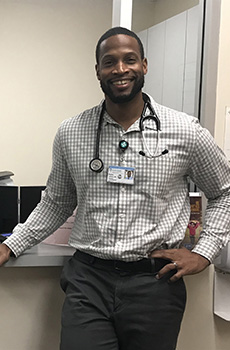At 6-feet, 3-inches tall with a naturally athletic build, SEBMF family medicine doctor Pasha Jackson, M.D., still looks like the linebacker who played for the Oklahoma Sooners in the 2003 Rose Bowl and 2004 Sugar Bowl.
Humanity can happen in the exam room by caring for your patient.
“Linebacker is a versatile position,’’ Dr. Jackson says. “It’s a thinking position, calling the plays and working with the defense, and you have to be large enough, fit enough and fast enough. I was energetic, and it spoke to me at the time.”
 While Dr. Jackson remains passionate about football, his main mission since joining the Sutter East Bay Medical Group last fall is caring for patients and collaborating with colleagues at SEBMF’s Richmond Care Center. “I’m happy to be here,” he says. “I had other options, but I saw that the need was greatest in this area. Primary care has been lacking, and I feel like a lot of good can be done here.” Also aiming to do good outside of the clinic, he intends to mentor or coach youth athletes in the community.
While Dr. Jackson remains passionate about football, his main mission since joining the Sutter East Bay Medical Group last fall is caring for patients and collaborating with colleagues at SEBMF’s Richmond Care Center. “I’m happy to be here,” he says. “I had other options, but I saw that the need was greatest in this area. Primary care has been lacking, and I feel like a lot of good can be done here.” Also aiming to do good outside of the clinic, he intends to mentor or coach youth athletes in the community.
Dr. Jackson first fell in love with football in high school, as the game helped him connect with adult mentors and other teens. Born in Chicago, he was raised by a single father who moved the family from city to city as he worked different jobs, eventually landing in the Bay Area. “Football was a guarantee to be with a group of guys who could be a community,” Dr. Jackson says. “I like the connection you get. Also, I am a driven person, and football gave me real challenges to face and let me go beyond what I thought were limitations.”
Though he pursued science classes at the University of Oklahoma, football was his top priority. After college, Dr. Jackson signed with the San Francisco 49ers. But due to various injuries and the changing nature of National Football League contracts, he signed with a succession of teams during his years in the NFL. Then while playing professionally in Amsterdam in 2005, he tore a pectoral muscle.
As he recovered, Dr. Jackson decided it was time for a “complete departure from football,” he says. “For me, that was medicine.”
Dr. Jackson enrolled in the Spanish emersion program at the Latin American School of Medicine (ELAM) in Havana. Part of the Cuban healthcare system, the international school was founded to educate physicians who grew up in poor communities and would commit to practicing in medically underserved areas.
Although studying medicine in a new language was daunting, Dr. Jackson really valued the experience. He loved the ELAM’s internationalism and hands-on approach, which lets students observe and assist physicians at any hospital in Cuba.
Plus, he picked up critical skills and philosophies that he practices today. “ELAM stresses humanity, and that’s what I hope I bring to Sutter,” Dr. Jackson says. “Humanity can happen in the exam room by caring for your patient, which means listening to them, looking away from the computer and taking time to read between the lines.”









